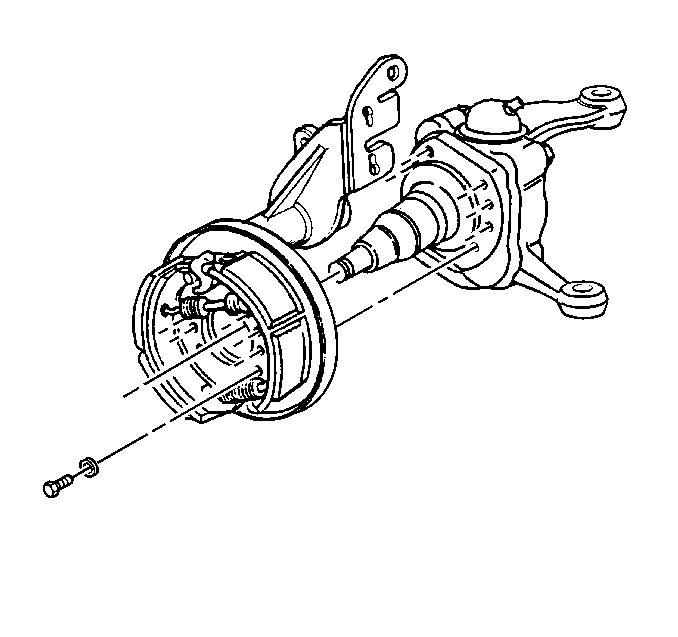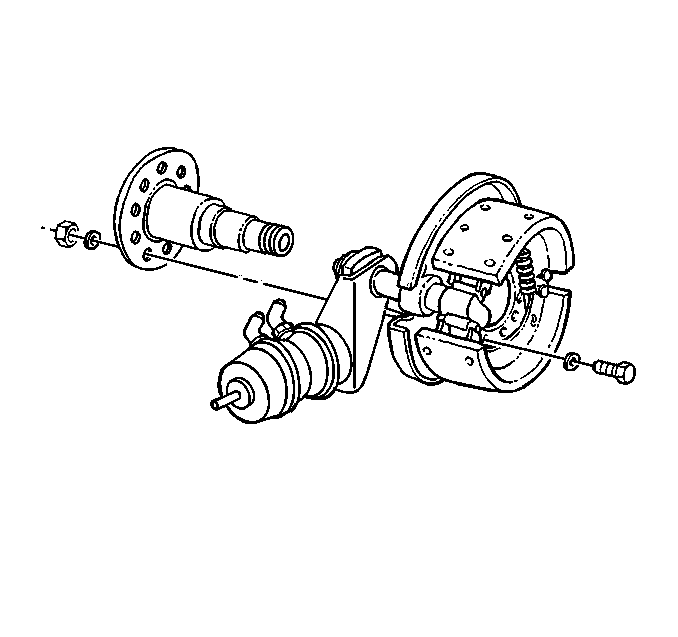Cam Brake Assembly Replacement Front
Removal Procedure
- Block the wheels.
- Drain the air reservoirs. Refer to Draining Reservoirs in Air Brakes.
- Raise and support the vehicle.
- Remove the tire and the wheel assembly. Refer to Wheel Removal in Tires and Wheels.
- Remove the brake drum. Refer to Brake Drum Replacement .
- Remove the air line from the front air brake chamber. Refer to Air Brake.
- Remove the wheel speed sensor, if equipped. Refer to Antilock Brakes.
- Remove the bolts and the washers.
- Remove the front brake assembly from the knuckle.

Installation Procedure
Caution: Avoid taking the following actions when you service wheel brake parts:
• Do not grind brake linings. • Do not sand brake linings. • Do not clean wheel brake parts with a dry brush or with compressed air.
- Install the front brake assembly to the knuckle.
- Install the washers and the bolts.
- Install the wheel speed sensor, if equipped.
- Install the air line to the front air brake chamber.
- Install the brake drum. Refer to Brake Drum Replacement .
- Adjust the front wheel bearings, if needed. Refer to Wheel Bearing Adjustment .
- Install the tire and the wheel assembly.Refer to Wheel Installation in Tires and Wheels.
- Remove the safety stands and lower the vehicle.
- Start the engine.
- Charge the air system to the air compressor governor valve cut-out point.
- Check for the proper brake operation.
- Stop the engine.
- Set the parking brake.
- Remove the wheel blocks.

Notice: Use the correct fastener in the correct location. Replacement fasteners must be the correct part number for that application. Fasteners requiring replacement or fasteners requiring the use of thread locking compound or sealant are identified in the service procedure. Do not use paints, lubricants, or corrosion inhibitors on fasteners or fastener joint surfaces unless specified. These coatings affect fastener torque and joint clamping force and may damage the fastener. Use the correct tightening sequence and specifications when installing fasteners in order to avoid damage to parts and systems.
Tighten
Tighten the front brake assembly bolts to 280 N·m (206 lb ft).
Cam Brake Assembly Replacement Rear
Removal Procedure
- Block the wheels.
- Drain all air reservoirs. Refer to Draining Reservoirs in Air Brakes.
- Cage the rear air brake chamber. Refer to Caging the Rear Air Brake Chamber .
- Raise and support the vehicle.
- Remove the tire and the wheel assembly. Refer to Wheel Removal in Tires and Wheels.
- Remove the brake drum. Refer to Brake Drum Replacement .
- Remove the air line from the rear air brake chamber. Refer to Air Brakes.
- Remove the wheel speed sensor, if equipped. Refer to Antilock Brakes.
- Remove the bolts and the washers.
- Remove the rear brake assembly from the rear axle.

Installation Procedure
Caution: Avoid taking the following actions when you service wheel brake parts:
• Do not grind brake linings. • Do not sand brake linings. • Do not clean wheel brake parts with a dry brush or with compressed air.
- Install the rear brake assembly to the rear axle.
- Install the washers and the bolts.
- Install the wheel speed sensor, if equipped.
- Install the air line to the rear air brake chamber.
- Install the brake drum. Refer to Brake Drum Replacement
- Adjust the rear wheel bearings, if needed. Refer to Wheel Bearing Adjustment .
- Install the tire and the wheel assembly. Refer to Wheel Installation in Tires and Wheels.
- Remove the safety stands and lower the vehicle.
- Start the engine.
- Charge the air system to the air compressor governor valve cut-out point.
- Check for the proper brake operation.
- Stop the engine.
- Set the parking brake.
- Remove the wheel blocks.

Notice: Use the correct fastener in the correct location. Replacement fasteners must be the correct part number for that application. Fasteners requiring replacement or fasteners requiring the use of thread locking compound or sealant are identified in the service procedure. Do not use paints, lubricants, or corrosion inhibitors on fasteners or fastener joint surfaces unless specified. These coatings affect fastener torque and joint clamping force and may damage the fastener. Use the correct tightening sequence and specifications when installing fasteners in order to avoid damage to parts and systems.
Tighten
Tighten the rear brake assembly bolts to 220 N·m (162 lb ft).
